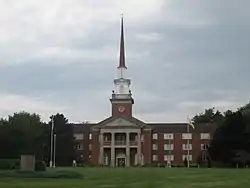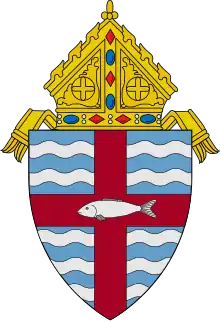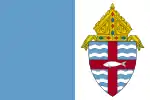Roman Catholic Diocese of Madison
The Diocese of Madison, Wisconsin, (Latin: Diœcesis Madisonensis) is the Roman Catholic diocese for the southwest corner of Wisconsin. It comprises Columbia, Dane, Grant, Green, Green Lake, Iowa, Jefferson, LaFayette, Marquette, Rock, and Sauk counties. The area of the diocese is approximately 8,070 square miles (20,900 km2). The Metropolitan for the diocese is the Archbishop of Milwaukee. There are about 270,000 Catholics in the Diocese. The bishop of the diocese was Robert C. Morlino until his death on November 24, 2018. Following Morlino's death the Diocese's College of Consultors elected Monsignor James Bartylla as diocesan administrator until a new Bishop is named.[3] On April 25, 2019 Donald J. Hying of the Diocese of Gary, Indiana announced that Pope Francis had named him the next Bishop of Madison.[4]
Diocese of Madison Diœcesis Madisonensis | |
|---|---|
 Bishop O'Connor Catholic Pastoral Center | |
 Coat of arms | |
 Flag | |
| Location | |
| Country | |
| Territory | Counties of Columbia, Dane, Grant, Green, Green Lake, Iowa, Jefferson, Lafayette, Marquette, Rock and Sauk, Wisconsin |
| Ecclesiastical province | Milwaukee |
| Statistics | |
| Area | 8,070 sq mi (20,900 km2) |
| Population - Total - Catholics (including non-members) | (as of 2004) 947,699 269,556 (28.4%) |
| Parishes | 104[1] |
| Schools | 46[2] |
| Information | |
| Denomination | Catholic |
| Sui iuris church | Latin Church |
| Rite | Roman Rite |
| Established | January 9, 1946 (75 years ago) |
| Cathedral | Saint Raphael's Cathedral |
| Current leadership | |
| Pope | Francis |
| Bishop | Donald J. Hying |
| Map | |
_map_1.jpg.webp) | |
| Website | |
| madisondiocese.org | |
There are 104 parishes in the diocese,[5] with approximately 98 priests in active ministry.[6] Under Morlino's leadership, the number of seminarians in the diocese grew from six men in 2003, when Morlino took over, to 30 in 2015. A diocesan-wide capital campaign was initiated to raise $30 million to help educate the future priests.[7][8]
Saint Raphael's Cathedral in Madison, destroyed by fire in 2005, had been the cathedral for the diocese. The diocese currently has no cathedral. Members of the Cathedral Parish worship at St. Patrick's and Holy Redeemer in Downtown Madison.
Camp Gray, a summer camp and retreat center, is one of the ministries of the Diocese of Madison.
History
Early years
The Madison Diocese was established on January 9, 1946, by Pope Pius XII, in a decree dated December 22, 1945. The diocese was created out of territory from the Archdiocese of Milwaukee and the Diocese of La Crosse and the Diocese of Green Bay.[9]
Venerable Father Samuel Charles Mazzuchelli was actively involved in the southwestern part of Wisconsin during the mid 19th century. He established 25 parishes in Wisconsin, 11 of which are in the Madison Diocese. Fr. Mazzuchelli is buried in Benton, Wisconsin, which is in the diocese. Pope John Paul II declared him venerable in 1993. The case for Fr. Mazzuchelli's elevation to the Sainthood is still pending.
In 2009 the diocese's direct appeal to raise operating funds brought in only 53% of its goal and the diocese had to lay off one-third of its 65 employees.[10]
Cathedral fire

On March 14, 2005. St. Raphael's Cathedral was heavily damaged in a fire that caused extensive damage to the church. In the days following the fire, it was found that William J. "Billy" Connell had set the fire. Connell was charged with burglary, arson, and bail jumping, but was deemed incompetent to stand trial due to paranoid schizophrenia. He was committed to an institution on August 29, 2005, pending a change in his mental health status,[11] and in June 2007, was sentenced to 15 years in prison followed by 15 years of close supervision.
Following the fire, the options regarding the future of the Cathedral included:
- Rebuild the Cathedral at the current site. Those in favor of that plan cited the historical significance of the parish as a reason for rebuilding the structure.
- Build a new Cathedral at another location in Madison, such as on the city's west side. People in favor of that cited the fact that St. Raphael's was not intended to be a Cathedral when built. Previous Bishops had considering building a new Cathedral elsewhere in Madison, as there was no room downtown to build a larger Cathedral church.
In June 2007, a decision was reached to erect a new building on the site of the old Cathedral, replacing the structure that was damaged in the fire. The new building will have a different floor plan than the previous building and be capable of seating approximately 1,000 people. It will reuse the steeple and other items that can be salvaged from the original building.
Reports of Sex Abuse
In June 2019, the Diocese of Madison agreed to present a list of credibly accused clergy who served in the Diocese and hired detectives to assist in this investigation.[12] This agreement came after a retired priest was charged in May 2018 with six counts of sexual assault[12] The retired priest, William Nolan, was later acquitted in September 2019 of five of these counts,[13] with the presiding judge also dropping the remaining count.[14] The Diocese of Madison also investigated Nolan and later cleared him from the title of "credibly accused" priest in March 2020 as well.[15]
Bishops
Bishops of Madison
- William Patrick O'Connor (1946–1967, Retired)
- Cletus F. O'Donnell (1967–1992, Retired)
- William H. Bullock (1993–2003, Retired)
- Robert C. Morlino (2003–2018†)
- Donald J. Hying (2019–present)
Auxiliary bishops
- Jerome J. Hastrich (1963–1969), appointed Bishop of Gallup
- George Otto Wirz (1977–2004)
Other priest of this diocese who became a bishop
- Paul J. Swain, appointed Bishop of Sioux Falls in 2006
Parishes
- Albany: St. Patrick Parish
- Argyle: St. Joseph Parish
- Ashton: St. Peter Parish
- Avoca: St. Joseph Parish
- Baraboo: St. Joseph Parish
- Barneveld: Immaculate Conception Parish
- Belleville: St. Francis of Assisi Parish
- Belmont: St. Philomena Parish
- Beloit: Our Lady of Assumption Parish
- Beloit: St. Jude Parish
- Beloit: St. Thomas the Apostle Parish
- Benton: St. Patrick Parish
- Berlin: All Saints Parish
- Blanchardville: Immaculate Conception Parish
- Bloomington: St. Mary Parish
- Boscobel: Immaculate Conception Parish
- Briggsville: St. Mary Help of Christians Parish
- Brodhead: St. Rose of Lima Parish
- Buffalo: St. Andrew Parish
- Calamine: St. Michael Parish
- Cambridge: St. Pius X Parish
- Cassville: St. Charles Borromeo Parish
- Castle Rock: St. John Nepomucene Parish
- Clinton: St. Stephen Parish
- Clyde: St. Malachy Parish
- Columbus: St. Jerome Parish
- Cottage Grove: St. Patrick Parish
- Cross Plains: St. Francis Xavier Parish
- Cuba City: St. Rose of Lima Parish
- Dane: St. Michael Parish
- Darlington: Holy Rosary Parish
- Dayton: St. James Parish - merged with St. Francis, Belleville
- De Forest: St. Olaf Parish
- Dickeyville: Holy Ghost Parish
- Dodgeville: St. Joseph Parish
- Doylestown: St. Patrick Parish
- Durward Glen: St. Camillus
- East Bristol: St. Joseph Parish
- Edgerton: St. Joseph Parish
- Elk Grove: St. Peter Parish
- Evansville: St. Paul Parish
- Fennimore: St. Mary Parish
- Footville: St. Augustine Parish
- Fort Atkinson: St. Joseph Parish
- Glen Haven: St. Mary Help of Christians Parish
- Gratiot: St. Joseph Parish
- Green Lake: Our Lady of the Lake Parish
- Hazel Green: St. Francis de Sales Parish
- Highland: Ss. Anthony and Philip Parish
- Hollandale: St. Patrick Parish
- Janesville: Nativity of Mary Parish
- Janesville: St. John Vianney Parish
- Janesville: St. Patrick Parish
- Janesville: St. William Parish
- Jefferson: St. John the Baptist Parish
- Jefferson: St. Lawrence Parish
- Johnson Creek: St. Mary Magdalene Parish
- Kieler: Immaculate Conception Parish
- Kingston: St. Mary Parish
- La Valle: Holy Family Parish
- Lake Mills: St. Francis Xavier Parish
- Lancaster: St. Clement Parish
- Lime Ridge: St. Boniface Parish
- Lodi: St. Patrick Parish
- Loreto: St. Patrick Parish
- Madison: Blessed Sacrament Parish
- Madison: Holy Redeemer Church
- Madison: Our Lady Queen of Peace Church
- Madison: St. Bernard Parish
- Madison: St. Dennis Parish
- Madison: St. James Church
- Madison: St. Joseph's Church
- Madison: St. Maria Goretti Parish
- Madison: St. Patrick's Church
- Madison: St. Paul's University Catholic Center
- Madison: St. Peter Parish
- Madison: St. Thomas Aquinas Church
- Markesan: St. Joseph Parish
- Marshall: St. Mary Parish
- Martinsville: St. Martin of Tours Parish
- Mazomanie: St. Barnabas Parish
- McFarland: Christ the King
- Merrimac: St. Mary Parish
- Middleton: St. Bernard Parish
- Mill Creek: St. John the Baptist Parish
- Milton: St. Mary Parish
- Mineral Point: Ss. Mary and Paul Parish
- Monona: Immaculate Heart of Mary Parish
- Monroe: St. Victor Parish
- Montello: St. John the Baptist Parish
- Montfort: St. Thomas Parish
- Mount Hope: St. Lawrence O'Toole Parish
- Mt. Horeb: St. Ignatius Parish
- Muscoda: St. John the Baptist Parish
- Neshkoro: St. James Parish
- Oregon: Holy Mother of Consolation Parish
- Palmyra: St. Mary Parish
- Patch Grove: St. John Parish
- Pardeeville: St. Mary Parish
- Perry: Holy Redeemer Parish
- Pine Bluff : St. Mary Parish
- Plain: St. Luke Parish
- Platteville: St. Mary Parish
- Portage: St. Mary of the Immaculate Conception Parish
- Potosi: Ss. Andrew and Thomas Parish
- Poynette: St. Thomas Parish
- Princeton: St. John the Baptist Parish
- Reedsburg: Sacred Heart Parish
- Rio: St. Joseph Parish
- Roxbury: St. Norbert Parish
- Sauk City: St. Aloysius
- Seymour Corners: Our Lady of Hope Parish
- Shullsburg: St. Matthew Parish
- Sinsinawa: St. Joseph Parish
- Spring Green: St. John the Evangelist Parish
- Stoughton: St. Ann Parish
- South Wayne: St. John Parish
- Sullivan: St. Mary Parish
- Sun Prairie: Sacred Hearts of Jesus and Mary Parish
- Sun Prairie: St. Albert the Great Parish
- Truman: Immaculate Conception Parish
- Verona: St. Christopher Parish (St. Andrew and St. William Churches)
- Waterloo: St. Joseph Parish
- Watertown: St. Bernard Parish
- Watertown: St. Henry Parish
- Waunakee: St. John the Baptist Parish
- Westfield: Good Shepherd Parish
- Westport: St. Mary of the Lake Parish
- Wisconsin Dells: St. Cecilia Parish
Cemeteries
Resurrection Cemetery is a Roman Catholic cemetery located on the near west side in Madison, Wisconsin, the seat of the Roman Catholic Diocese of Madison. The cemetery is one of four cemeteries officially managed by the diocese. It was founded in 1949 and is about 40 acres in size.
The official address of Resurrection Cemetery is 2705 Regent Street. The cemetery is located on a hill and is bordered by the following streets: Regent Street to the north, Franklin Avenue to the west, Hillcrest Street to the south, and Speedway Road to the southeast. Nearby landmarks include West High School about one block away, and the Veterans Administration Hospital, University of Wisconsin Hospital & Clinics, and American Family Children's Hospital about 8 blocks away.
Resurrection Cemetery is located across Speedway Road from Forest Hill Cemetery, the Protestant or non-Catholic cemetery.
Famous people whose resting place is Resurrection Cemetery include Madison native Chris Farley, comedic film star and Saturday Night Live cast member, whose crypt is located in the chapel on the cemetery grounds. The first two bishops of the diocese, William O'Connor and Cletus O'Donnell, are buried in the cemetery.
Schools
High schools:
- Edgewood High School of the Sacred Heart, Madison
- St. Ambrose Academy, Madison
Grade schools:
- St. Joseph's Catholic School in Baraboo is a parochial school. The current school building, designed by the Wisconsin Rapids company Billmeyer and Sons and with a cost of over $500,000, has 11 classrooms. The basement has a cafeteria and a combination auditorium/gymnasium. The second building for the school opened on a filled-in ravine in 1912, northeast of its associated church. The building had three floors and a basement. The first and second floors each had three classrooms, and the second floor also housed the chapel and the library. The third floor had a 600-seat auditorium while the basement had a large banquet hall/gymnasium. The second building became overcrowded due to the post-World War II baby boom, so the third school building, north of the second building, opened in 1958.[16]
See also
- List of the Catholic dioceses of the United States
- List of Roman Catholic dioceses (alphabetical) (including archdioceses)
- List of Roman Catholic dioceses (structured view) (including archdioceses)
References
- "Our Parishes". Diocese of Madison.
- "Schools". Diocese of Madison.
- Schultz, Robert (November 26, 2018), "Morlino funeral is Dec. 4; Bartylla elected to run Diocese until new bishop is selected", Wisconsin State Journal, Madison, Wisconsin, retrieved November 26, 2018
- Dolan, Bill (April 25, 2019), "Bishop Hying leaves Gary to become bishop in Wisconsin's state capital", The Times, Gary, Indiana, retrieved April 25, 2019
- "Our Parishes". Diocese of Madison.
- "All Priests in the Diocese". Diocese of Madison.
- 608-252-6149, DOUG ERICKSON [email protected]. "As number of seminarians surges, Madison diocese seeks $30M to fund priest training".CS1 maint: numeric names: authors list (link)
- "Priests For Our Future Capital Campaign". Diocese of Madison.
- "Diocese of Madison". Catholic-Hierarchy.org. David M. Cheney. Retrieved 21 January 2015.
- "". Wisconsin State Journal, January 24, 2010.
- https://web.archive.org/web/20051206145401/http://www.channel3000.com/fire/4907849/detail.html. Archived from the original on December 6, 2005. Retrieved September 2, 2006. Missing or empty
|title=(help) - https://madison.com/wsj/news/local/madison-catholic-diocese-hires-detectives-to-probe-clergy-sexual-abuse/article_afc2e437-999e-58c3-ab56-5aa004822e7c.html
- "Retired Catholic priest found not guilty of sexual assault". 14 September 2019.
- https://www.dailyunion.com/news/nolan-testifies-as-defense-rests-its-case/article_7aafa1e7-4309-504a-9eb6-1b6d7676297d.html
- https://www.gazettextra.com/news/local/priest-accused-of-sex-abuse-cleared-by-madison-diocese/article_a5bb9598-80c4-5da9-8aeb-8ce56e1ea95c.html
- Sauk County Historical Society. Baraboo. Arcadia Publishing, 2017. ISBN 1467125105, 9781467125109. p. 84.
External links
Arms
 |
|